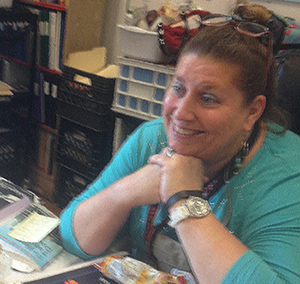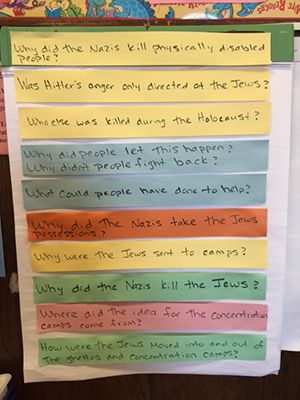
Karen Haynie
Ten years ago, Karen Haynie brought testimony from USC Shoah Foundation into her classroom by having her students gather around a single computer to watch the videos.
USC Shoah Foundation’s educational offerings may have grown considerably since then, but Haynie’s enthusiasm for testimony hasn’t waned. She and her students piloted the new IWitness activity “Finding your Seat on the Bus” earlier this year, allowing USC Shoah Foundation to evaluate its success in a middle school classroom, and followed up with a lesson Haynie devised to help her students find answers to their questions about the Holocaust.
Haynie worked with Amy M. Carnes, Ph.D., USC Shoah Foundation Associate Director of Education – Evaluation and Scholarship, to complete “Finding Your Seat on the Bus” in her seventh grade classroom at Ella Flagg Young Elementary School in Chicago earlier this year. Students worked on the activity over the course of the week and participated in focus groups with Carnes to share what they had learned.
The students were very excited to participate in the pilot and enjoyed “Finding Your Seat on the Bus,” Haynie said. She appreciated being able to track each student’s progress in IWitness and give them immediate feedback. The timing was also perfect because they were in the middle of their civil rights unit and would be starting their Holocaust unit next, so it got the students interested in what was to come.
"This resource makes my students more sympathetic to the people from that time."
Haynie said IWitness appeals to her because it uses primary sources, and because the testimonies are so powerful.
“Hearing and seeing the survivors talk about their experiences really lets students experience that time in history through their voices,” Haynie said. “We won't have living survivors for very much longer, and I think the recordings of them really helps kids to understand better what they went through.”
When Carnes returned to Chicago earlier this month to follow up on the pilot, Haynie shared the new project her students were working on with IWitness. They came up with questions they have about the Holocaust and are searching through IWitness to find the answers in testimonies.

Haynie said because IWitness is a different format for research than her students are used to, it allows them to exercise new skills in critical thinking. It also provides an opportunity for students who aren’t strong readers to focus on their other strengths.
“Students also have to think and infer while synthesizing when they use this resource in order to find their answers,” Haynie said. “So they have to use many different reading skills we work on during the year to help them.”
IWitness helps students really connect to history and to the survivors themselves, Haynie said. They understand that the Holocaust happened to real people and become excited to learn about the topic. She’s also noticed that her students’ written responses are better because they can draw on their emotions.
“I've had many of the students comment that ‘watching the testimonies made them feel as if they were there with that survivor,’” she said. “The students could tell it was a hard time ‘because you could hear it in their voices and see it on their faces.’ This resource makes my students more sympathetic to the people from that time, but also more empathetic too.”